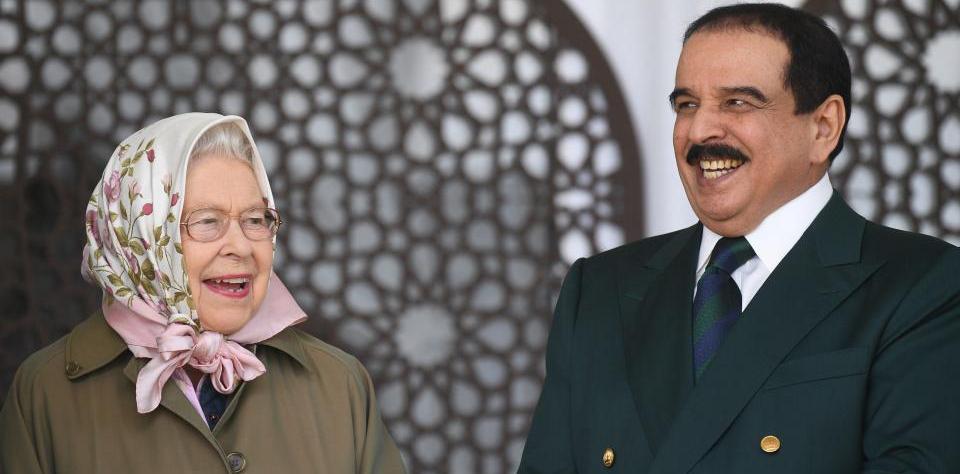
RNA - Britain, a country with deep and historical influence in the tiny Persian Gulf Island and holding special relations with the ruling regime of Al Khalifa, has always come against any possible changes in the power structure or even reform of the political system of Bahrain. London opposition against any kind of reform in Bahrain was even worsened by the fear of possible spillover of the same wave to its other regional ally, Saudi Arabia.
Since eruption of the Bahrain’s peaceful revolution at the time of the revolts in other Arab countries against the authoritarian political systems in 2011, London provided support for Al Khalifa rulers as they used an iron-fist policy against the reform-seeking protesters.
Defying the blames of their own public opinion as well as the rights organizations' criticism during the past six years, the British leaders supplied Manama with various weapons, including the anti-protest equipment. Other measures by Britain have been taken to display the conditions normal in Bahrain, like helping Manama to organize the Formula 1 competitions, expanding diplomatic relations with Al Khalifa, and hosting the Bahraini rulers in London. These moves by the British government are meant to buy legitimacy for Al Khalifa dynasty.
The Bahraini King Hamad bin Isa Al Khalifa and his son Naser bin Hamad Al Khalifa have recently travelled to London at an official invitation from the British government to join a horse show. Arrived in London last week to show up at the Royal Windsor Horse Show, the Bahraini royals were received by a rally of Britain-based Bahraini dissenters. The Bahraini opposition sources noted that the protestors carried banners that read” Hamad is a criminal and not a special guest”, a demonstration that is seen by the analysts as also a condemnation of the British government’s pro-Khalifa policies that emboldens the regime to quash the protests without fear of being criticized by the international community.
Additionally, footage showed the Bahraini protestors in the horse fair, where King Hamad and Prince Naser were among the visitors, lifting a banner reading “UK should stop support for Bahrain's dictator.”
Not only the London officials have declined to heed the dissent condemnation but also the British police have dispersed the protests and detained some of them. The British pro-Khalifa stances despite an apparent public challenging of rule of the king comes while London has posed as a defender of the human rights in West Asian conflicts, including Syria’s crisis. Britain’s support for Bahrain rulers, the analysts argue, is paradoxical and lays bare London's adoption of double standards in dealing human rights cases.
The British approach in dealing with the human rights issues in the chaotic West Asia region is influenced by consideration of interests in various areas. In Bahrain, the backing stems from Britain’s historical sway over the ruling Al Khalifa family in the tiny Persian Gulf Arab kingdom. Another reason driving such a favor for Manama is the economic interests of Bahrain for British. In fact, the Khalifa family’s bonds to Britain date back to the colonial period and are heavily tied to the toehold in the regime’s political structure.
The British ethnicity-based policies in West Asia, bring the Manama rulers close to London. During the history of Bahrain, from the establishment of the regime up to now, Britain never wavered to have the back of the royal family, emboldening it to firmly put down the popular protests that renew themselves regularly in fresh uprising.
After outbreak of the 1990s uprising in Bahrain, dabbled uprising of dignity, the Bahraini royals rushed to sign security pacts with Britain. Fearing a popular uprising heralding fall of their rule, Manama leaders entrusted their country’s security to London officials. Concerned about losing a beneficial ally, Britain took the initiative and played a crucial role in preventing success of the anti-regime revolution.
The same behavior has been observable in Britain’s policy during the second wave of anti-Khalifa uprising, now in its sixth year. The British Foreign Office for years avoided calls for contacts with Bahrain’s opposition, but it saw it unavoidable to open channels with them when it felt that the regime was under risk of collapse due to sizable public antipathy.
Britain has had a security role in Bahrain and trained the Bahraini security forces. It offers rights consultation to the Al Khalifa and provides for the regime anti-protest equipment including the tear gas and plastic bullets. Actually, the Bahraini government is supplied with any security solutions to suppress the rallies that are regularly held against it. Furthermore, in terms of security intelligence richness, Britain holds a special place in the eyes of the Bahraini rulers and shapes their approach towards the opposition.
The role of the UK in Bahrain’s crisis was also exposed when Britain at the 37th summit of the (Persian) Gulf Cooperation Council (PGCC) in Manama early in December 2016 announced reopening its military bases in the small kingdom, declaring that it was returning to the region after nearly six decades. In PGCC summit, Theresa May, without raising any concerns over the repression of the Bahraini people’s demonstrations, highlighted a need for renewed alliance with the Persian Gulf Arab states to curb what she called Iran's interventions in these countries' domestic affairs.
Despite the fact that Bahrain human rights conditions have always been subject to criticism of the international organizations, King Hamad of Bahrain has always been one of the invitees of the British royal celebrations and festivals. Moreover, the sports events, including the Formula 1, are massively covered by the British media, revealing to the world the London's double standards towards the regional uprisings.
847/940
Source: Alwaght